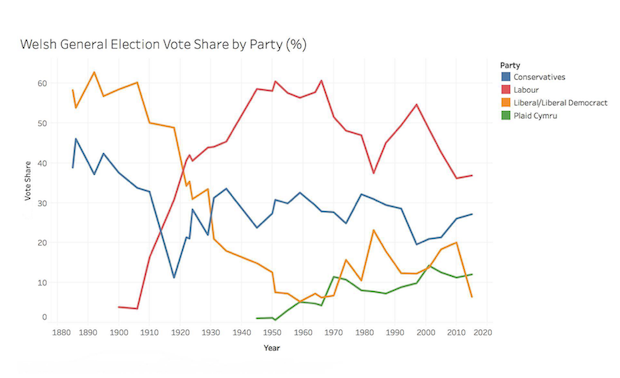Last week a Wales Governance Centre (WGC)/ITV Wales poll by YouGov sent shockwaves through the UK’s political landscape by reporting a ten-point lead for the Conservatives over Labour in Wales. The poll was described by Welsh psephologist-in-chief Roger Scully as the beginning of a potential “electoral earthquake.” If the poll is accurate—and that is an important “if”—the Conservatives could win as many as 21 of Wales’ 40 seats, breaking two historic characteristics of Welsh politics.
The first of these is Labour hegemony. Since 1922, Labour has won every general election in Wales and, as of 1935, has also won a majority of Welsh seats. Labour’s dominance in Wales has not been limited to general elections. Over this period, it has won every National Assembly, local and EU election bar one: the 2009 European Parliament Elections, where it was narrowly edged into second place by the Conservatives. This period of near-complete dominance has made Labour in Wales one of the most effective electoral machines in Europe.The second characteristic that looks to be coming to an end is the Conservative Party’s historic weakness in Wales. The Tories’ lack of success in Wales pre-dates Labour dominance; the last time the Conservatives won the popular vote in Wales was 1859. To place this in historical context, the Tories’ last major success at a general election in Wales occurred two years before the American Civil War had begun, when the they won 2,767 of 4,352 votes cast. As recently as the 1997 and 2001 general elections, no Conservative MPs were elected in Wales. This makes their sudden standing in the polls even more impressive, as they could potentially move from zero MPs to a majority in just 16 years.
So how has this happened? Whilst the Conservatives are undoubtedly benefitting from some recent political developments, there are also long-term trends that have contributed to their recent fortune. Chief among these is the “dealignment” of the Welsh electorate and the subsequent downwards trend in support for the Labour Party in Wales. This has been particularly apparent in Labour’s diminishing general election vote share since the late 1990s. Voters are increasingly less likely to develop an attachment to a political party because of social identity (i.e. their social class, the area they grew up in etc.). Instead, the electorate is more sensitive to short-term factors, such as party leader images, recent political events, and policy preferences.

There are also a series of short-term factors that look to be aiding the Conservatives. Although Labour’s decline has been a gradual phenomenon, the Conservatives’ rise has been very swift—only in January they were polling five points behind Labour in Wales. We know that this is not because of Labour voters switching to them, so where has this support come from?
The polling data tells us clearly that it can be attributed to the rapid decline in support for UKIP. In 2015 UKIP won 13.6 per cent of the Welsh vote, yet of the previously UKIP voting respondents in the Wales Governance Centre poll, nearly two-thirds said they would now vote Conservative (compared to just 2 per cent who said they would switch to Labour).
This of course leads us onto the impact of Brexit in this election. Theresa May has been keen to portray the main issue of this election as Brexit, and that is likely to be a useful tactic in Wales. Some excellent work by Chris Hanretty has produced reliable estimates of the EU referendum vote by constituency across the UK. According to these estimates, of Labour’s 25 seats in Wales 19 voted to leave, with the average leave vote in Labour constituencies (54.3 per cent) slightly higher than the all-Wales average of 52.5 per cent. These constituencies are likely to be fertile ground for May’s Brexit messaging, especially given Welsh Labour’s near universal backing of the Remain campaign.
Another thing that stood out in WGC poll was that Conservative support was considerably higher when respondents were asked about their general election preferences, compared to their local election and Assembly voting preferences. At the local and devolved levels, the Conservatives had only a one point lead over Labour. The party’s enhanced popularity at the general election suggests that there is something about the UK Conservatives that the Welsh electorate particularly like. Or, something unique to UK Labour that they don’t like.
In results that were perhaps as surprising as the voting intention findings, the WGC poll shows that May is now the most popular of any political party leader in Wales. Corbyn is by no means the least popular party leader (UKIP’s Paul Nuttall and its leader in Wales, Neil Hamilton, both take these credits), but is markedly less popular than First Minister Carwyn Jones. This perhaps explains the difference in vote intentions between Westminster and devolved levels, and does not bode well for Labour’s chances. Since 1983, the party of the most popular leader at the UK level has won every general election.













